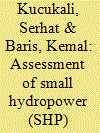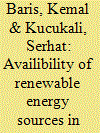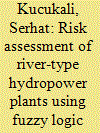|
|
|
Sort Order |
|
|
|
Items / Page
|
|
|
|
|
|
|
| Srl | Item |
| 1 |
ID:
091542


|
|
|
|
|
| Publication |
2009.
|
| Summary/Abstract |
This paper aims to evaluate the development of small hydropower (SHP) in Turkey and discusses the current situation of SHP plants in terms of government policy, economical aspects and environmental impacts taking EU policy into account. The laws published in recent years in Turkey succeeded in promoting the utilization of renewable energy for electricity generation, but it is considered that those laws are not fully compatible with EU policy. After the publication of Renewable Energy Law (Law No. 5346) there occurred a boost in SHP project along with hydropower development. Thus, the hydropower potential of Turkey increased 15% and the construction of hydropower plants also increased by a factor of four in 2007 as compared to 2006. Investment and operating costs are in favor of SHP development in Turkey as having the lowest costs among European countries (300-1000 €/kW as investment cost and 1 €cent/kWh as operating cost). Turkish governments have taken precautions for environmental issues resulted from renewable energy utilization but these are obviously not adequate. It is concluded that more attention must be paid on environmental issues and monitoring of the facilities must be enabled with further laws or regulations.
|
|
|
|
|
|
|
|
|
|
|
|
|
|
|
|
| 2 |
ID:
111430


|
|
|
|
|
| Publication |
2012.
|
| Summary/Abstract |
This study aims to explore the availability and potential of renewable energy sources in Turkey as well as assessing related government policies, financial and environmental aspects of renewable energy projects. Turkey is a country which has the highest hydropower, wind and geothermal energy potential among European countries. As a European Union (EU) candidate several incentives were developed in Turkey for electricity generation from renewable energy sources by the enactment of Law No. 5346 in 2005 which was later restructured by Law No. 6094 in 2010. The most important ones are: ease of land acquisition and feed-in-tariffs which promise purchasing of electricity generated and domestic manufacturing of equipment by the private companies with a price of 5.30-9.69 and 0.3-2.55 €c/kWh, respectively, depending on the type of the renewable and the equipment. However, feed-in tariff amounts take reservoir area into account instead of installed capacity for hydroelectric power plants. Moreover, Environmental Impact Assessment (EIA) report is not mandatory for all renewable energy plants. According to the multi-criteria analysis tool developed in this study to evaluate the renewable energy source (RES) technologies the most appropriate renewable energy alternative for Turkey is biomass, simply because of the highest social benefit among others.
|
|
|
|
|
|
|
|
|
|
|
|
|
|
|
|
| 3 |
ID:
094917


|
|
|
| 4 |
ID:
099227


|
|
|
|
|
| Publication |
2010.
|
| Summary/Abstract |
This paper aims to analyze the hydropower potential of municipal water supply dams in Turkey. The facility is in favor with the energy policy of Turkish Government and European Union. In the study, the design head of the power plant was selected as the average water level of the reservoir and the discharge was calculated from the annual water supply of the dam. It has been estimated that the existing 45 municipal water supply dams of Turkey have an electric energy potential of 173 GWh/year, corresponding to about 24,000,000 Euro/year economic benefit. The financing of these facilities can be provided from international funding institutions. For a case study, Zonguldak Ulutan Dam and its water treatment plant have been investigated in detail. The current electricity consumption of the water treatment plant is 4,500,000 kWh/year and the facility provides 35,000 m3/day water to 6 settlements. The installation of a hydropower plant on the mentioned water treatment plant will cut the electric consumption by 24%. The proposed project has a payback period of 1.4 years and it can produce clean and feasible energy.
|
|
|
|
|
|
|
|
|
|
|
|
|
|
|
|
| 5 |
ID:
109710


|
|
|
|
|
| Publication |
2011.
|
| Summary/Abstract |
In this paper, a fuzzy rating tool was developed for river-type hydropower plant projects, and risk assessment and expert judgments were utilized instead of probabilistic reasoning. The methodology is a multi-criteria decision analysis, which provides a flexible and easily understood way to analyze project risks. The external risks, which are partly under the control of companies, were considered in the model. A total of eleven classes of risk factors were determined based on the expert interviews, field studies and literature review as follows: site geology, land use, environmental issues, grid connection, social acceptance, macroeconomic, natural hazards, change of laws and regulations, terrorism, access to infrastructure and revenue. The relative importance of risk factors was determined from the survey results. The survey was conducted with the experts that have experience in the construction of river-type hydropower schemes. The survey results revealed that the site geology and environmental issues were considered as the most important risks. The new risk assessment method enabled a Risk Index (R) value to be calculated, establishing a 4-grade evaluation system. The proposed risk analysis will give investors a more rational basis to make decisions and it can prevent cost and schedule overruns.
|
|
|
|
|
|
|
|
|
|
|
|
|
|
|
|
| 6 |
ID:
094939


|
|
|
|
|
| Publication |
2010.
|
| Summary/Abstract |
This paper aims to forecast Turkey's short-term gross annual electricity demand by applying fuzzy logic methodology while general information on economical, political and electricity market conditions of the country is also given. Unlike most of the other forecast models about Turkey's electricity demand, which usually uses more than one parameter, gross domestic product (GDP) based on purchasing power parity was the only parameter used in the model. Proposed model made good predictions and captured the system dynamic behavior covering the years of 1970-2014. The model yielded average absolute relative errors of 3.9%. Furthermore, the model estimates a 4.5% decrease in electricity demand of Turkey in 2009 and the electricity demand growth rates are projected to be about 4% between 2010 and 2014. It is concluded that forecasting the Turkey's short-term gross electricity demand with the country's economic performance will provide more reliable projections. Forecasting the annual electricity consumption of a country could be made by any designer with the help of the fuzzy logic procedure described in this paper. The advantage of this model lies on the ability to mimic the human thinking and reasoning.
|
|
|
|
|
|
|
|
|
|
|
|
|
|
|
|
|
|
|
|
|